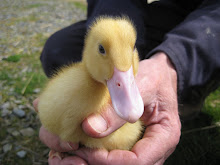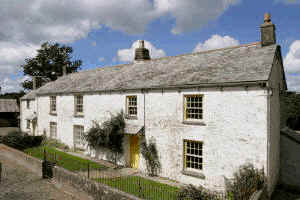Yesterday I became just seven weeks away from half my Mother's age; she will be ninety before the year is out. I sit here goggling at the thought, as has everyone before me who has reached their middle years and realised that their school mates are probably older now than their teachers were then. I feel the reality of it drift and sink in my head like sand.
I woke up to a gratifying heap of cards, knowing that today was not my turn to do the animals. I could do a bit of duvet wallowing, just enough to savour the cosiness. Then my ears pricked; there were sounds. Voices. A bit of Led Zeppelin.
John Humphrys. Yes. YES!
Radio 4. In stereo. Loud. Clear. All mine. I scooted downstairs, and saw it - a new, discreet cable headed south from the ceiling attaching the tuner to the chimney mounted radio aerial. Two and a half years I have waited, patiently and not so patiently for this moment. I
go away for a couple of days and miracles have been worked, the floorboards lifted and replaced, connections made. I can now listen to The Archers and get a handle on how to farm for real. I know how much effort went into this. I am thrilled, I am moved, I am jigging about with pleasure.
There are books, wrapped in pink princesses and white ponies. As intended, I drop forty years in as many seconds and feel the pleasures of pulling off paper from unknown goodies. I stroke the book on
owls, their incredible faces captured for me to look at again and again. And last of all, a wooden boot jack, again made in my brief absence, from oak board removed and saved from the dilapidated calf pens. It is beautiful, it is waxed and sealed, and will be used every day. Underneath, the carpenters mark of the maker and giver is stamped clear. I stroke that too.
I chat on the phone to say thank you for the
book tokens as the finishing touches are made to my birthday cake.
Adult chocolate,
raspberries picked fresh from the garden, cream, heaven. It is proudly secured in the fridge away from tongue wielding pets, as I pack the car for a day out.
Back to
Northcott Mouth for a taste of paradise. There are just two other cars parked. The tide is out, the dogs romp off the lead by our sides, and we leave first footprints on virgin sand. The sea is vigorous, the breeze brisk, the sun generous for November. I wear warm wellies, a jacket and a wide smile. There are black fish in the rock pools, thick as a finger and twice as long. Mussels are picked; Mopsa tries some straight from the rocks, cracking the shells with her teeth. The rocks and stones are beautiful, ancient as time. Moments don't get any better than this.
Back at the farm
the builders are starting to take control of the site. Two containers arrive as site hut and store. A small and ugly breeze block gatepost has to be removed so that the lorry delivering the containers can reach its destination. For a change someone else is doing the work; it is a very strange feeling.
A bunch of flowers has been left, no note, by the front door. There are more cards in the day's post. Friends drop by and we eat ambrosial slabs of chocolate and raspberry cake and drink tea until it's pitch black outside. The fire is lit, Scrabble is played, but I don't concentrate, turning over as I am the pleasures of the day. I listen to The Archers and Front Row for the first time in this house. I drink champagne and eat some fabulous
kedgeree with a generous addition of tiger prawns and mussels
c/o the National Trust. Would forty-five more birthdays just like this one be too much to ask?
 I am hoping to adopt the vocabulary of the enthusiast. You know the kind of thing; you overhear a group of folks yacking on happily about their shared pet subject and it has all the meaning of gobbledegook until you have been initiated into the intricacies of the language.
I am hoping to adopt the vocabulary of the enthusiast. You know the kind of thing; you overhear a group of folks yacking on happily about their shared pet subject and it has all the meaning of gobbledegook until you have been initiated into the intricacies of the language.






























